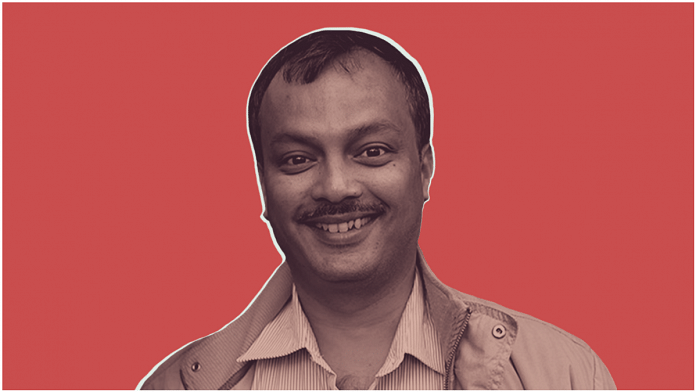New Delhi: An award-winning author, an IIT professor and a newspaper columnist — Arupjyoti Saikia is a titan of Indian academia who has spent years studying the economic, agricultural and political history of Assam.
There was thus an outcry this weekend as he was summoned by the anti-terror National Investigation Agency (NIA) for interrogation Saturday, reportedly in connection with the violent anti-Citizenship Amendment Act (CAA) protests that rocked Assam in December.
Said to have been questioned for two hours Saturday, Saikia was again summoned Monday for another round of interrogation.
As many as 42 of Indian academia’s most prominent voices have questioned the basis of his interrogation, saying it was deeply distressing that “a scholar of such standing, and a human being of such decency, has been called for intensive grilling by the NIA”.
Who is Arupjyoti Saikia
An eminent researcher and historian with a career spanning two decades, Saikia joined the Indian Institute of Technology-Guwahati in 2006 where he currently holds the Suryya Kumar Bhuyan Endowment Chair on Assam History.
In 2012, he completed a postdoctoral fellowship in agrarian studies at the prestigious Yale University, an experience he credits with shaping his latest book, The Unquiet River: A Biography of the Brahmaputra, which was published last year.
The Unquiet River received rave reviews, with critics calling it “much more than a seminal contribution to environmental history”. It has also been described as a “cautionary tale”, one that tells the Indian government how “re-engineering Brahmaputra through dams or run-of-the-river projects is fraught with consequences”.
His earlier writings have been released to great reception as well. In 2015, he was awarded the Srikant Dutta Memorial Book award by the Nehru Memorial Museum and Library for his book A Century of Protests: Peasant Politics in Assam Since 1990.
This is one of the few books on peasant uprisings and protests in Assam’s history.
Also read: Have arrested 85 protesters & detained 2,000, more being identified via videos: Assam DGP
‘Links’ with Akhil Gogoi
The NIA reportedly summoned Saikia as a witness in connection with a case against peasant leader Akhil Gogoi, founder of a peasant body called Krishak Mukti Sangram Samiti (KMSS)
Gogoi was arrested by the NIA on 12 December over his alleged role in the December protests and charged with sedition and provisions of the Unlawful Activities (Prevention) Act.
Summons for Saikia came weeks after Assam Finance Minister Himanta Biswa Sarma claimed that “an unnamed academic working in a central institution in Assam” was “monitoring” the violence accompanied anti-CAA protests in the state.
While the NIA is yet to give an official statement, Saikia’s lawyer Santanu Borthakur confirmed that the historian was called as a “witness… in connection with Gogoi’s December 2019 case”.
“Saikia denies all allegations made against him, including his involvement with Gogoi and the violence that took place on 11 December at the Assam Secretariat last year,” he added.
Academics stand with Saikia
On Sunday, 42 academics, including Ramachandra Guha, Nivedita Menon and Pratap Bhanu Mehta, issued a public statement calling Saikia’s questioning “deeply distressing”.
“We urge that the NIA treat him with the dignity and respect he deserves, and allow him to continue his professional work unimpeded…” the statement said. “He is an individual of high moral character; gentle, soft-spoken, and utterly non-violent.”
Speaking to ThePrint, Menon, a professor at Jawaharlal Nehru University in Delhi, said Saikia’s questioning was an example of the “rapid shutdown of Indian democracy”.
She added that the academics’ letter was a call against the “intimidation of absolutely legitimate protests against the CAA”.
“Half of India is against the CAA… Saikia is a renowned academic and there seems to be no basis on which the NIA is questioning him,” Menon added. “Himanta Biswa Sarma’s statement was irresponsible.”
Brijesh Rai, a former faculty member at IIT-G, said Saikia was “a researcher of social welfare… who speaks to many people for the purpose of his research”.
“Him speaking to anybody, whoever it may be, shouldn’t be a reason for the NIA to question him. I don’t think Saikia is related to the violence,” he added. “We can only hope that the NIA handles the case with utmost care.”
A relative of Saikia said they feared he will be called in for questioning a third time.
An acquaintance added that Saikia’s “struggle” may have just begun. “We hope he is not summoned again and again by the NIA,” said the acquaintance.
Also read: In 2020, don’t rely on routine rallies and marches. Modi’s India needs new ways to protest




It does not give him right to spread misinformation
Any scholar of eminence does give him right to spread and support misinformation on a law passed by parliament.
Tukde gang closing ranks
Your report on Sh. Arupjyoti Saikia rests on the proposition that a scholar of eminence cannot involve in anti national movements or activities. On the contrary most of the people who were involved in divisive activities and antinational movements were scholars par excellence. Farzeel Imam, Kanahiya Kumar and some their allies are are scholars. Similarly Iqbal, Jinnah, Osama bin Laden, etc. were also scholars. So, your defence for the said IIT professor rests on a very week or rather meaningless ground.
If NIA suspects one’s involvement in unlawful activities it must interrogate him/her irrespective of his/ her learning, religion etc. It is the duty of the investigating agency . We have courts in our country to protect the innocents.